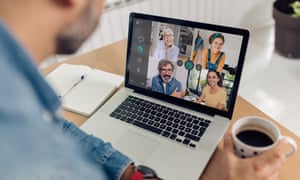‘I could not have performed it with out the group’: three small enterprise homeowners on the issues they’ve realized from one another | Getting again on observe

Small business owners have found a collaborative spirit online by sharing tips and tricks and establishing support networks. Photo: Getty Images
On a cold December day in 2019, Aisha Jade was huddled at her stall in London’s Surrey Street Market. Earlier this year, inspired by its Jamaican roots, Jade launched Carisips, a brand of natural drinks flavored with Caribbean flavors such as tamarind, ginger, and sorrel. “I went to market to test the trade – to get feedback from customers, to improve the product,” she says.
The passer-by Jon Quintanilla Del Mar, owner of Quintanillas’ Cordials, interviewed – and generously conveyed his knowledge of the sector. Not only did he get them to think about the cost of their time and pricing, but he also explained to Jade, “How to improve the taste and flavors, gave me advice on manufacturing processes, preservation, and even what sugar levels to avoid the sugar tax when I grow as a company, ”she says.
Finally, she followed his advice. A year later they’re still in touch, and Jade’s new savory tamarind liqueur – which can be made into a drink, drizzled over ice, or used as a marinade – is their best-selling product.
The past year has been an incredible challenge for many companies, but independent businesses have proven to be more resilient than chain stores. In the first half of 2020, the number of independent stores closed was less than a third of the number of chain stores that ceased trading.
Hannah Cox, founder of Manchester-based management consultancy Betternotstop, has found that during this time, small businesses have truly come together. Like the weekly round of applause held at the start of the pandemic to recognize NHS workers, a supportive energy seems to have sprung up in the small business community – leaning on one another was a natural response. In these precarious times there is strength in numbers.

Groups were created to help small businesses add value to one another. Photo: RgStudio / Getty Images
Kirsty Taylor-Moran, who owns Sugar and Scoop’s zero-waste business in Ware, Hertfordshire, also swears by taking active advice from other business owners. When she started in early 2020, she found a Facebook group for shopkeepers without waste that was full of advice on merchants, ethical and sustainable suppliers, food safety requirements, and waste and recycling. “I can’t even think of a topic that isn’t discussed in this group. There is so much research going on to find suppliers, but a lot of that hard work has been done for me, ”says Taylor-Moran.
One of the group’s founding members was particularly helpful, she says. “Tiriel Lovejoy has three zero waste stores in Bristol so he’s pretty experienced. The nice thing about the group is that it’s not competitive or secret at all. We realize that we are in separate areas. It’s more about reducing plastic waste than monopolizing it. “
The collaborative spirit not only stabilized the course of business at Cox, it also changed it. Prior to the pandemic, Betternotstop had offered burnt-out business owners overseas retreats to regroup, re-prioritize, and explore new regions. But when Covid hit, Cox had to rethink her plans.
Fortunately, she recently set up what was known as a “responsibility group”: eight small companies from different sectors selected to be part of a support network. Monthly workshops help to create mutual added value. The group – all with positive social and environmental impacts as part of their core values - was instrumental in transforming Betternotstop into a consulting firm dedicated exclusively to helping companies achieve these goals, according to Cox.
They figured out who she really wanted to reach and gave honest feedback on Cox’s tendency to get distracted from her main business goals. She even conducted pro bono counseling for one of the members of the group to gain more experience with the steps to achieve B Corp status, which has shown increased interest during the pandemic. Helping businesses with B Corp certification is now Cox’s primary service. “After the crazy year we’ve had, I don’t think I could have done it without it [my group],” She says.
British Business Bank is a government business development bank that helps thousands of businesses across the UK access the financial information and support they need to get them back on track. British Business Bank plc and its subsidiaries are not and do not operate as banking institutions. Accordingly, none of the British Business Bank groups accept deposits or provide banking services. Please visit british-business-bank.co.uk for more information
